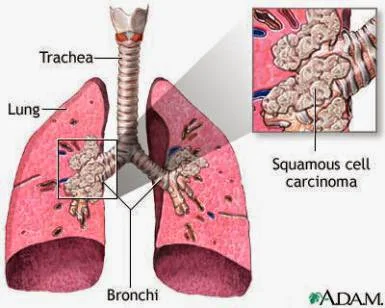Squamous Cell Lung Cancer is a pulmonary neoplasm that is not benign. Squamous cell lung cancer is epithelial in origin. This type of neoplasm has no boundaries in its growth or spread within the different lobes of lungs. The signs and symptoms of squamous cell lung cancer are similar to any type of a severe pulmonary neoplasm such as coughing up bloody material, difficulty breathing (dyspnea), and weight loss. Squamous cell lung cancer is considered a destructive neoplasm in the lungs. Therefore, additional attention is given incorporating support in anti-cancerous therapy involving multi-drug combinations.
In many patients, this tends to spread to other tissues including kidney or bone. Assuming it spreads to bones, most of the times, the mandible or skull may get affected. Squamous cell lung cancer may need additional confirmation from more pathologists who are specialized in such diagnosis. Clinical effects seen in one patient affected by this type of cancer may not reflect the same affects in other patients. Factors like target organ of cancer cells, compromise of the immune status of the patient, effects of medications including alternate drug therapy which may even include restrictions in multiple diets in order to avoid constant exposure to the carcinogens that have some association with food components, etc. All of these indicate multiple factors that are associated with the production of squamous cell lung cancer.
It is advantageous to stay abreast of updated technical information on various pathogenesis and factors associated with signs and symptoms of this cancer in lungs involving squamous cells. One treatment of this type of lung cancer is radioactive implants. Subsequent to surgery radioactive implants are surgically placed which have the capability to emit constant waves of radiation. Treatment may not give 100% guarantee on the recovery of the affected patient from the very rapid spread of squamous cell lung cancer.
Squamous Cell Lung Cancer, Killer No Mercy?
One of the more common types of cancer that you will find in the United States is squamous cell lung cancer. Although it's true that thousands of people die from this condition each year, there are still ways to prevent it from spreading and potentially causing death. Even with the most aggressive cancer treatment, there is still the chance of a return, and you will need to be prepared for that. Too many people who have cancer right now do not know enough about their own condition. This type of cancer is part of non small cell lung cancer, and squamous cell carcinoma is only one of them. There is large large cell carcinoma as well as adenocarcinoma.
One of the more common types of cancer that you will find in the United States is squamous cell lung cancer. Although it's true that thousands of people die from this condition each year, there are still ways to prevent it from spreading and potentially causing death. Even with the most aggressive cancer treatment, there is still the chance of a return, and you will need to be prepared for that. Too many people who have cancer right now do not know enough about their own condition. This type of cancer is part of non small cell lung cancer, and squamous cell carcinoma is only one of them. There is large large cell carcinoma as well as adenocarcinoma.
The squamous cancer cells you have in your body are flat ones that resemble fish scales. This is a very common characteristic of squamous cell lung cancer, and it's a major part of how doctors diagnose those who have it. The cancer cells, for all the different types of cancer, spread in their own individual ways, and it can be extremely difficult to tell which path your condition is going to take.
Predictability of cancer cells has always been one of the major issues for doctors and scientists to pursue as quickly as possible. However, the undependability of cancer cells continues to puzzle doctors. Sometimes it is a complete mystery why a malignant or cancerous cell spreads to another part of the body with seemingly no provocation whatsoever. It is important that you know what you can do to prevent this kind cancer from developing, or keeping it from worsening. Most people know that smoking can directly cause cancer; however that is especially true with small cell cancer like this. Over a long period of time, these chemicals can have a very serious adverse effect on your body in the form of cancer. Continuing to use tobacco, after having been diagnosed with cancer is just counter-productive to any medical plan.
If you are experiencing even one of these symptoms to a serious degree, then you will want to get checked out by an experience medical professional as soon as possible. The longer you wait to be examined, the more the cancer has a chance to spread to another part of your body. Get regular check-ups and physicals, talk to your doctor about your condition and any changes in your health. Early detection and diagnosis is one of the few real weapons doctors have in their arsenal to help you survive squamous cell lung cancer.


















0 Comments
Thanks for your attention . Please writing comment